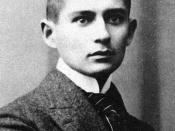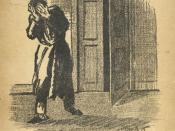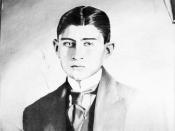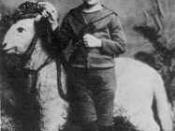Franz Kafka is a writer of power struggles. In his short stories "The Dream" and "An Imperial Message", he proposes that an individual in society has an internal conflict between the life they live and the life they imagine. Kafka demonstrates this through the device of escapes: escapes from reality and escapes from society.
First, in the short story "The Dream", Kafka proposes the protagonist mentally escapes from reality through a dream. This suggests an internal struggle related to the protagonist's life given that the story describes how "... the path continued rushing along beneath his [the protagonist's] feet as he leaped off ..." (Kafka 278). The path, relating to the constant flow of life and how the world will not stop and wait for you, does not hesitate to test the protagonist. Instead, the path creates difficulty for the protagonist and sets a challenge for him to overcome: the difficulty of jumping from a moving object.
In the character's reality, Kafka suggests a world where the protagonist is incapable of keeping up with the complexity of what is around him. This will create an unsettling, negative conscience that will put a damper on the protagonist's view of his surroundings.
Secondly, in the short story "The Dream", Kafka also proposes the use of art as a 'dreamlike' escape. Symbols are used to represent the superiority within the protagonist's dream. For example, "Through some extremely skilful manipulation, he [the artist] succeeded in producing gold letters with that ordinary pencil ..." (Kafka 279). To begin with, the ordinary pencil signifies a lack of imagination. When used to produce gold lettering, the artist - a figure of powerful imagination - turns this object into a magical tool. Simultaneously, the gold lettering proposes the superiority of the protagonist. Kafka describes art within the story as "... clean and beautiful, deeply incised and in purist gold" (279) creating a way to escape and express the protagonist's innermost feelings and views of society. These feelings are of the natural suffering of man-kind.
To contrast, in Kafka's second short story "An Imperial Message", Kafka also uses symbols; in this case the emperor, messenger, and recipient all act as symbols of the human need to escape societal boundaries. The emperor within the short story is set to never have complete control over his rulings. This is revealed when Kafka expresses the emperor's situation: he, the emperor, is on his deathbed. He wishes for a message to be sent out to an anonymous recipient. The message will never reach the recipient due to the social structure of the empire. The empire - representing a global civilization - is endless and takes much effort to escape the boundaries. Kafka explains that a messenger who is sent by the emperor to deliver the message...will never make it; and if he succeeded, nothing would be gained: he wouldhave to fight his way down the staircases; and if he succeeded, nothing would be gained:he would have to stride across the courtyards; and after the courtyards the second enclosing palace; and again staircases and courtyards; and again a palace; and so on for thousands of years. (264)The recipient is an isolated citizen with hopes for a better life. This recipient had escaped the empire and has now run out of time for their dream to come true. For want of this undelivered message, the recipient will never feel the effects of the emperor's passing.
In conclusion, the usage of escapes, from both reality and society, is a desire to get away from actuality. In life, one only has what is given to them, what they earn, or what they fight for. The longing for change in a personal life or in a community needs to be act upon, or else change will never come.
Works CitedKafka, Franz. "A Dream" in The Metamorphosis, In the Penal Colony, and Other Stories.
Toronto: Simon & Schuster, 1995.
Kafka, Franz. "An Imperial Message" in The Metamorphosis, In the Penal Colony, and OtherStories. Toronto: Simon & Schuster, 1995.







Well done.
I really think you did a great job, especially when I imagine your in 11th grade.
Nevertheless, I must say that you have to expatiate on Kafka's works and describe them very thoroughly.
0 out of 0 people found this comment useful.